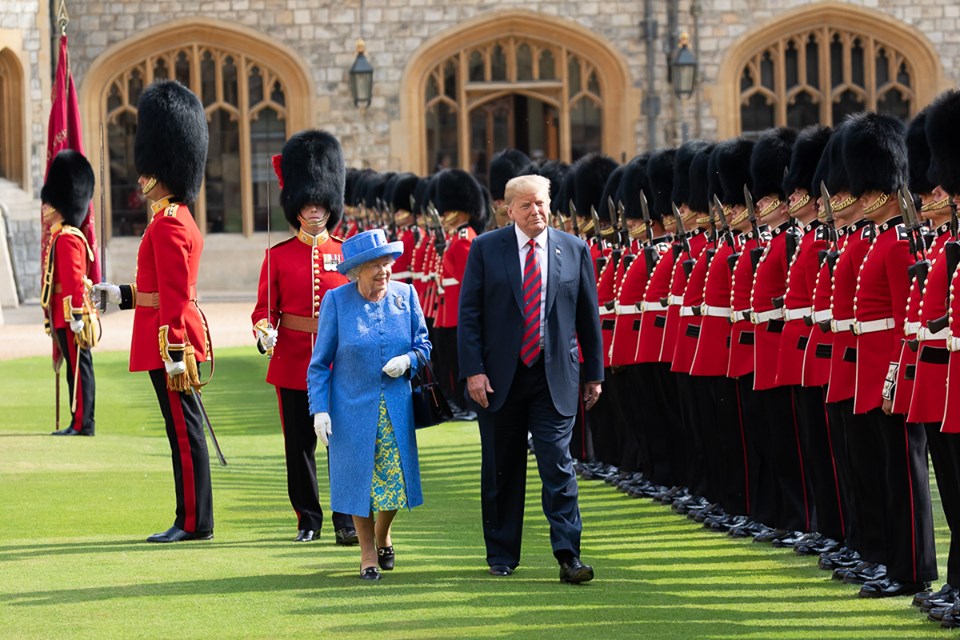
LONDON — President Donald Trump arrived in Britain on Monday in a trip that the White House is billing as a chance to honour shared sacrifice and service between the United States and its longtime ally across the Atlantic.
The agenda for Trump’s weeklong journey is largely ceremonial: a state visit and an audience with Queen Elizabeth II in London, D-Day commemoration ceremonies on both sides of the English Channel and his first presidential visit to Ireland, which will include a stay at his coastal golf club.
But the U.S. president will arrive at a precarious moment, as he faces a fresh round of impeachment fervour back home and uncertainty on the other side of the Atlantic Ocean. British Prime Minister Theresa May will step down days after Trump visits and French President Emmanuel Macron is expected to use the 75th anniversary of the World War II battle that turned the tide on the Western Front to call for strengthening the multinational ties the U.S. president has frayed.
“My greatest hope is this: the president and all the leaders stay focused on the extraordinary heroism of that of D-Day and focusing on what brought allies to that position,” said Heather Conley, senior vice-president of the Center for Strategic and International Studies. “Dark clouds are forming once again in Europe, and rather than encourage those forces, we need to find much better tools to defeat them.”
Trump and his family are facing a two-day whirlwind of pomp, circumstance and protests, including meetings with the royal family and an extravagant state dinner at Buckingham Palace. Demonstrators are expected, including the possible return of an inflatable balloon depicting the president as a baby.
A year ago, Trump was an ungracious guest, blasting May in an interview just hours before Air Force One touched down in England. He has done it again, this time sparing May but praising her rival, prime ministerial hopeful Boris Johnson, just before she steps down as Conservative leader Friday for failing to secure a Brexit deal.
“I think Boris would do a very good job. I think he would be excellent,” Trump told The Sun. “I like him. I have always liked him. I don’t know that he is going to be chosen, but I think he is a very good guy, a very talented person.”
It was not clear if the Trump endorsement would hurt or help Johnson’s chances of becoming Britain’s next leader.
Before leaving the White House Sunday evening, Trump waded in again to his hosts’ domestic affairs. He told the Sunday Times that Britain should “walk away” from Brexit talks and refuse to pay a 39 billion pound ($49 billion) divorce bill if it doesn’t get better terms from the European Union. He said he might meet with another pro-Brexit politician, Nigel Farage, during his visit, and claimed Farage should be given a role in the Brexit negotiations.
Trump also fired back at London Mayor Sadiq Khan, who called the U.S. leader a “growing global threat” and said he should not get the red-carpet treatment in Britain. Trump said he has no interest in meeting Khan and that “I don’t think much of him.” Trump added that “he’s the twin” of New York Mayor Bill de Blasio, one of the Democratic candidates entering the 2020 U.S. presidential race.
Khan supporters have accused Trump of being racist against London’s first Muslim mayor.
At least some of Trump’s fancy welcome should have awkward moments. The formal tea hosted by Charles brings together a future king who has warned repeatedly about the perils of climate change with a president who is actively dismantling U.S. policies designed to slow global warming.
In the interview with The Sun, Trump weighed in on the American-born Duchess of Sussex. The former Meghan Markle, who gave birth to a son in May and will not attend the week’s events, was critical of Trump in the past, prompting the president to tell the tabloid, “I didn’t know that she was nasty.” He said later in the interview that he thought Markle would be “very good” as a royal.
Trump will make his first presidential visit to Ireland on Wednesday. But what should have been a routine visit with the prime minister grew complicated due to Trump’s unprecedented blending of government duties and his own business promotion. Trump will spend two nights at his golf club in Doonbeg, which sits above the Atlantic. After Dublin balked at holding a meeting there, a deal was struck for Trump to meet Irish Prime Minister Leo Varadkar at Shannon Airport.
The centerpiece of the president’s visit will be two days to mark the 75th anniversary of the June 6, 1944, D-Day anniversary, likely the last significant commemoration most veterans of the battle will see. The anniversary events will begin in Portsmouth, England, where the invasion was launched, and then move to Normandy, France, where Allied forces began to recapture Western Europe from the Nazis.
The day is normally a heartfelt tribute to unity and sacrifice, outweighing any national or political skirmish. But some on both sides of the Atlantic are nervous about Trump, who has shown a willingness to inject partisanship into such moments. Trump also has been embroiled in simmering disputes over trade and military spending with fellow Western democracies.
On his most recent European visit, last November in France, Trump was heavily criticized for skipping a ceremony at an American military cemetery to mark the 100th anniversary of the end of World War I when rain grounded his helicopter. European leaders, meanwhile, stood in the rain to honour the dead.
———
Lemire reported from New York. Associated Press writer Zeke Miller in Washington contributed to this report.